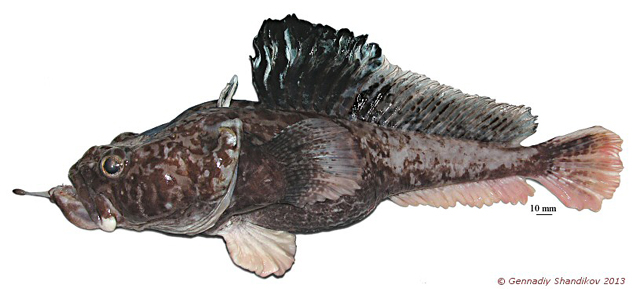| Artedidraconidae (Barbled plunderfishes) |
| 35.5 cm TL (male/unsexed); 35 cm TL (female) |
|
bathypelagic; marine; depth range 700 - 1390 m |
| Antarctic Pacific: Ross Sea. |
|
Dorsal spines (total): 2-2; Dorsal soft rays (total): 27-27; Anal soft rays: 18-18. This species is distinguished from other species of the 'P. mentella' group by the following set of characters: short and tiny mental barbel, light-brownish dorsally, reaching anterior edge of orbit over snout with mouth closed, its length about 9% SL; a very short poorly developed ovaloid terminal expansion composed of bicolored, white and brownish, scale-like and mostly bluntly palmate processes, the length is less than 1/3 of barbel length; lower jaw moderately protruding with weakly visible anterior teeth on symphysis and hidden dorsum of tongue when mouth is closed; the second dorsal fin is high in male (height about 25% SL), without any prominent anterior elevated lobe, with longest rays (1st to 7th) very soft, sinuous distally and branched from about mid-length, this fin is almost entirely black in coloration with bluish insertions in anterior one third and dark basally with light upper margin posteriorly; dorsal surface of head and area anterior to first dorsal fin is covered by dark-brown irregular spots, vermiculations and markings; belly, breast and lower surface of head brown or brownish in general and no distinct dark spots; light mandibular oral valve; pectoral fin vertically dark-striped in its anterior part and uniformly lightish in posterior part (Ref. 93381). |
|
|
Not Evaluated (N.E.) Ref. (130435)
|
| harmless |
Source and more info: www.fishbase.org. For personal, classroom, and other internal use only. Not for publication.
